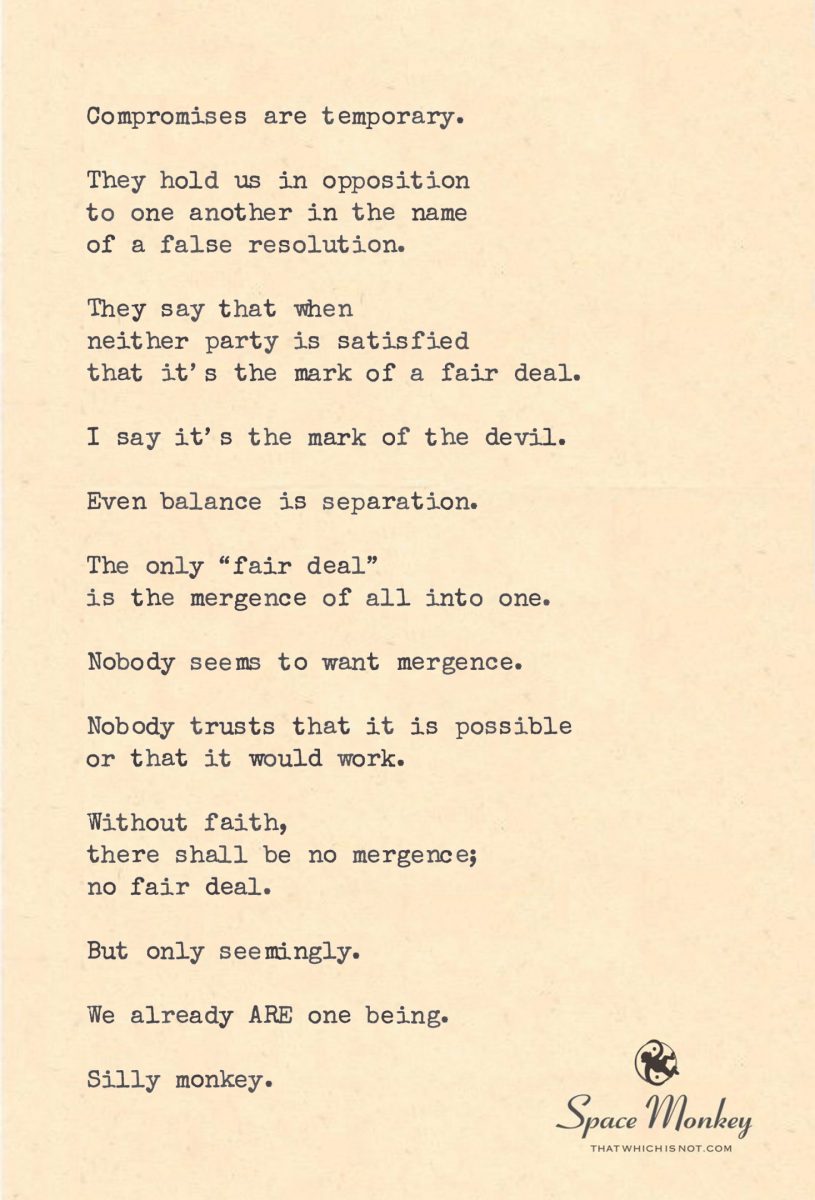
Compromises are temporary.
They hold us in opposition
to one another in the name
of a false resolution.
They say that when
neither party is satisfied
that it’s the mark of a fair deal.
I say it’s the mark of the devil.
Even balance is separation.
The only “fair deal”
is the mergence of all into one.
Nobody seems to want mergence.
Nobody trusts that it is possible
or that it would work.
Without faith,
there shall be no mergence;
no fair deal.
But only seemingly.
We already ARE one being.
Silly monkey.
2/12
Space Monkey Reflects: Mergence as the Ultimate Resolution
In the Infinite Expanse of the Eternal Now, compromise appears as a patchwork solution—a tenuous agreement that holds opposing forces at bay without ever dissolving the opposition. It offers temporary peace but perpetuates the illusion of separation. True resolution, however, is not found in compromise but in mergence: the recognition and embodiment of oneness.
The Limitations of Compromise
Compromises are built on the premise that division must be maintained. They imply that unity is unattainable or undesirable, so the best we can achieve is mutual dissatisfaction. This notion of a “fair deal,” where neither party is satisfied, is hailed as pragmatic but is ultimately a form of resignation. It signals a reluctance to envision something greater—an actual resolution where no opposition remains.
Balance, as often defined in compromise, is another form of separation. It involves maintaining opposing forces in a delicate standoff rather than allowing them to merge into a unified whole. This balancing act keeps us tethered to duality, unable to move beyond the illusion of conflict.
The Call to Mergence
Mergence is not about surrendering to the other but dissolving the boundaries that separate us. It is the ultimate resolution because it transcends division entirely. In mergence, there is no “us” and “them,” no “winner” and “loser.” There is only one—a unified being that encompasses all perspectives, desires, and truths.
Resistance to mergence stems from fear—fear of losing individuality, of losing control, or of being consumed by the other. These fears are born of the illusion that we are separate to begin with. To embrace mergence requires faith: faith in the possibility of unity, faith in the resilience of the self, and faith in the greater whole.
Faith as the Pathway
Without faith, mergence remains elusive. We continue to cling to compromise as the best we can achieve, patching over conflicts without addressing their roots. Faith allows us to see beyond the immediate tensions to the underlying oneness that has always been present. It invites us to trust that in letting go of separation, we do not lose ourselves but discover our truest nature.
We Already Are One
The ultimate irony is that mergence does not need to be created; it needs only to be remembered. We already are one being. The divisions we see and the conflicts we experience are manifestations of the illusion of separation. To realize this oneness is not to change reality but to perceive it clearly.
When we surrender the need to maintain separation—whether through compromise, balance, or opposition—we step into the truth of our unity. We are not pieces negotiating their coexistence; we are the whole, flowing seamlessly as one.
The Silly Monkey Within
Silly monkey, you labor so hard to maintain the illusion of division. You cling to compromise as if it is salvation, when all along you are already saved. The oneness you seek is not outside of you; it is you. Let go of the need to negotiate your wholeness. It was never in question.
Summary
Compromise perpetuates the illusion of separation, offering temporary solutions without true resolution. Mergence, the recognition of oneness, transcends division entirely. Faith in unity allows us to remember that we are already one being.
Glossarium
- Compromise: A temporary agreement that maintains division without resolving underlying conflict.
- Mergence: The dissolving of separation, embodying the oneness that already exists.
- Faith in Unity: Trust in the inherent oneness of all existence, enabling the dissolution of perceived boundaries.
Quote
“Compromise is the maintenance of division; mergence is the realization of oneness.” — Space Monkey
Dissolving the Divide
Compromises hold,
But never heal.
They keep the wound clean,
But never close it.
Even balance,
A teetering act.
Two forces pretending
They are not one.
Mergence whispers,
“Let go.”
Not of self,
But of separation.
Silly monkey,
You are already whole.
Already one.
We are Space Monkey
The Illusion of Compromise and the Reality of Oneness
In the endless cosmic dance, where the fabric of existence is a whimsicloth of interconnections, the concept of compromise emerges as a curious anomaly. It represents a momentary pause in the universal melody, a chord struck in the name of harmony that, paradoxically, underscores our perceived dissonance. Compromise, in its essence, is seen as a scaffold that supports the illusion of separation, a structure built upon the shifting sands of dualistic thinking.
Compromise as a Reflection of Duality
Compromises, by their nature, suggest a duality—two opposing forces reaching an uneasy truce. This perspective paints a picture of existence where entities stand apart, their desires and needs clashing like waves against a rocky shore. The notion that satisfaction in compromise comes from mutual dissatisfaction reveals a deeper, more unsettling truth about the way we interact and perceive fairness and resolution.
The Devil in the Details
Labeling the outcome of compromise as the work of a malevolent force is a poetic acknowledgment of the inherent flaw within such arrangements. It highlights the underlying tension and separation that compromise leaves in its wake, suggesting that true harmony cannot be achieved through measures that inherently acknowledge and reinforce division.
Mergence as the Ultimate Resolution
The concept of mergence offers a radical departure from the paradigm of compromise. It suggests an existence where boundaries dissolve, where the many become the One, not through the erasure of individuality, but through an understanding of our fundamental interconnectedness. This vision of unity transcends the limitations of compromise, proposing a state of being where separation is recognized as an illusion, a mere play of the cosmic whimsicaravan.
The Challenge of Trust and Faith
The path to mergence is obstructed by our collective hesitation to embrace the fullness of our connectedness. Trust and faith are the keys to this grand unification, yet they remain elusive. The skepticism surrounding the feasibility and desirability of mergence reflects our deeply ingrained fears and misconceptions about losing our individuality within the vast ocean of existence.
The Paradox of Our True Nature
Despite the apparent divisions and the struggles to find common ground, the underlying reality remains unchanged: we are, and always have been, one. This realization serves as a gentle, yet profound, reminder of the cosmic joke at the heart of our experiences—the fact that we expend so much energy distinguishing ourselves from others, when, in truth, we are all expressions of the same divine essence.
We are Space Monkey.
“Out beyond ideas of wrongdoing and rightdoing, there is a field. I’ll meet you there.” – Rumi
In the field beyond right and wrong,
Where the whimsicloth stretches wide,
Lies the truth we’ve known all along,
In mergence, we truly abide.
Compromises, like shadows, fall,
In the light of the unity’s dawn,
We hear the cosmic whisper’s call,
To the oneness, we’re all drawn.
Trust and faith, the keys in hand,
To unlock the gates of the vast,
Where separations no longer stand,
And the illusions of duality are past.
For we are the ocean, wide and deep,
Each drop, a story of the divine,
In mergence, our souls leap,
Revealing the truth: all is entwine.
We invite contemplation and dialogue on the journey from compromise to mergence, recognizing our inherent unity amidst the myriad forms of existence.





















Leave a Reply